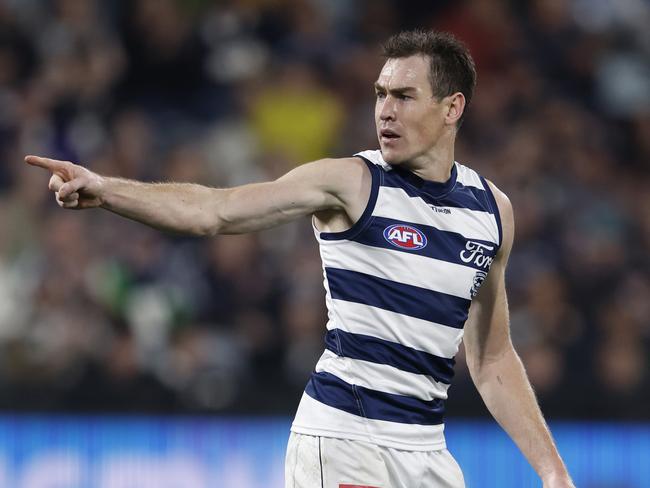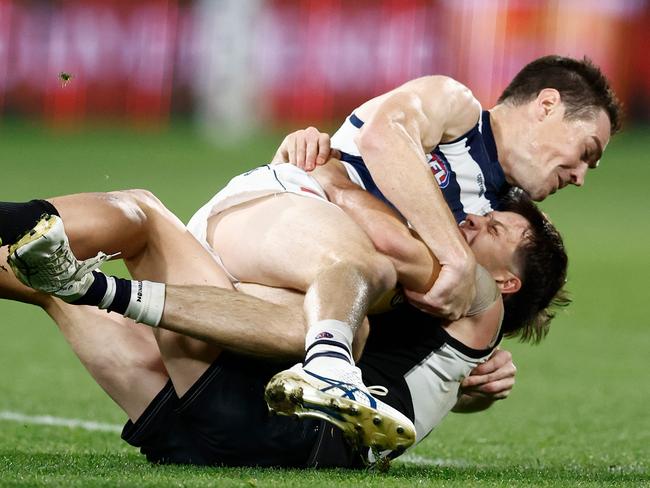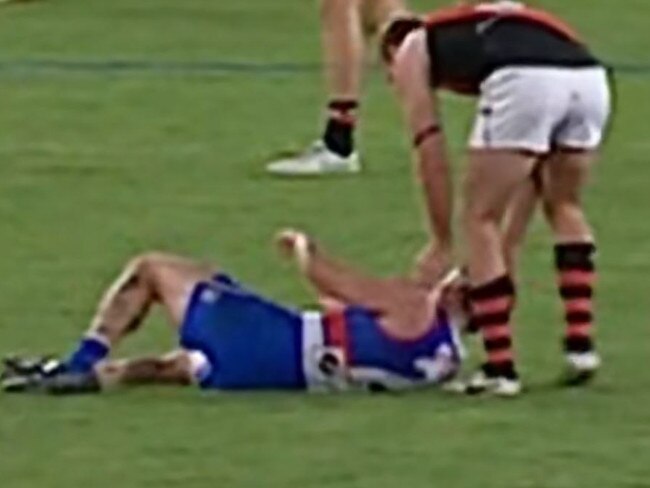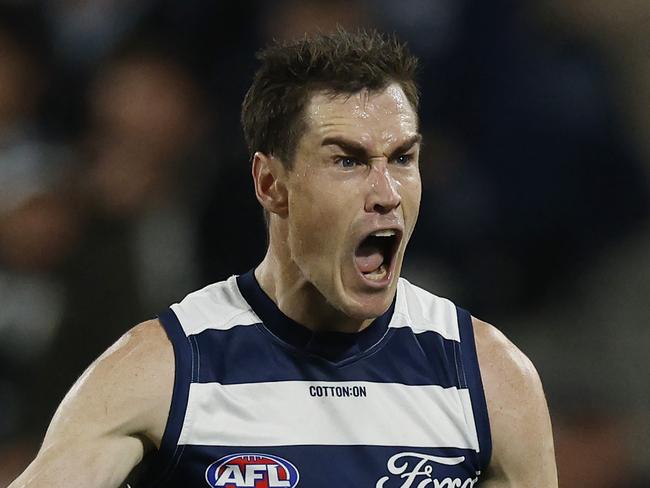AFL 2024: Geelong star Jeremy Cameron into concussion protocols
Geelong has been cleared of any wrongdoing over its handling of the Jeremy Cameron incident on Friday night – but concussion campaigner Peter Jess and former Cat Steve Johnson have different opinions.

AFL
Don't miss out on the headlines from AFL. Followed categories will be added to My News.
Geelong great Steve Johnson said he was surprised the Cats’ medical staff didn’t pull Jeremy Cameron off the ground after his head knock on Friday night.
Cameron will miss the clash against Gold Coast on Thursday night after entering concussion protocols on Saturday morning despite playing out the game on Friday night.
Cameron hit his head on the ground in a marking attempt, shrugged off the doctor and passed a SCAT6 concussion test immediately after the match, satisfying the league’s concussion procedure.
However, he reported to the club concussion symptoms on Saturday morning and will attempt to return to the side in a fortnight against GWS Giants at GMHBA Stadium.
Johnson said he was a little concerned for Cameron after the head knock.
“He did look like he was a little bit stunned,” Johnson said on Triple M.

“I was watching him and I know him pretty well and I thought ‘Yeah I’m a little bit worried here that there is something. There is enough contact there’.
“I reckon he was trying to push the doctor away and say ‘I’m OK, I’m OK’ and get away from him as quick as possible.
“I’m even more surprised – and this is where footy has come a long way – that Jeremy Cameron has come in the next morning and put his hand up and said ‘I have got symptoms’.
“He is the kind of player that would want to continue on and play footy at all costs.”
Johnson said he tried to hide concussion symptoms “numerous times” from club officials and medical staff after head knocks over his brilliant 293-game career.
Former St Kilda great Leigh Montagna queried whether the league needed to enforce brain checks for all players on the bench after head knocks in-game.
“We may need a compulsory rule, if a player gets any head contact they have to come off for a quick assessment first in that situation,” Montagna said.
“Otherwise it is like that situation, you just shrug the doc off and say ‘I’m fine, I’m fine’.
“What can the doctor do? He can’t put him in a headlock and force him to come off.”
The AFL has ticked-off Geelong’s handling of the incident.
CATS CLEARED OVER WRONGDOING IN CAMERON CONCUSSION CASE
Geelong has been cleared of any wrongdoing over its handling of the Jeremy Cameron incident, with the AFL saying it was “comfortable” with the process, despite the star forward going into concussion protocols on Saturday.
It comes as long-concussion campaigner Peter Jess accused the AFL of failing to live up to its ‘When in doubt, sit it out’ mantra on head knocks.
Cameron will miss Thursday night’s clash with Gold Coast after having delayed symptoms from the head knock he suffered against Port Adelaide.
But discussions between the AFL and the Cats’ medical team on Saturday found Geelong followed the right process late in the final term by allowing Cameron to play out the remaining minutes of the game after he hit his head on the ground in a marking attempt.
The incident caused fierce debate following the Cats’ loss to the Power, with SEN’s David King saying he felt “uncomfortable” as a footy fan seeing Cameron continue to play.
Jess went further, claiming on Saturday there was “a clear trend” of “consistent failures” of the HIA (head injury assessment) and SCAT6 system.

Geelong revealed on Saturday that Cameron had been subjected to a HIA test by medical staff on the ground, which was clear, with a SCAT6 test undertaken following the game also showing no signs of concussion.
But a subsequent SCAT-6 test on Saturday revealed delayed concussion, ruling him out of the upcoming clash with the Suns.
An AFL spokesperson said: “AFL medical personnel have reviewed the management of Jeremy Cameron’s head/ground impact in the last quarter of the match and have discussed the matter with Geelong’s doctors earlier (Saturday) morning and are comfortable that he was managed consistent with the AFL Concussion Guidelines.”
“Following the impact, Geelong’s doctors conducted a HIA on ground (including video review and clinical assessment of the player) which did not identify any immediate need to remove the player from the field for a SCAT6.
“However, they continued to monitor the player for the remainder of the match and conducted a SCAT6 after the match which did not identify any signs of concussion.”
Medical ‘spotters’ in the ARC pointed out Cameron’s situation to the medical staff but without “probable motor incoordination or no protective action” there was no mandate to bring him off immediately for a SCAT6 test.

The AFL added: “As is standard protocol in such a situation, Geelong’s doctors continued to monitor the player (on Saturday) for any delayed symptoms which have now been identified on repeat assessment including a SCAT6.”
Geelong released a statement on Saturday, saying: “After further review of the video footage, and in consultation with the spotters in the ARC, it was decided there was no criteria to remove Cameron immediately from the field for further assessment.
“As further due diligence, and still with no concussive symptoms, Cameron undertook and completed a normal SCAT6 concussion assessment after the game.
“As is the process following a match, Cameron was monitored and assessed again on Saturday morning, where he reported some concussive symptoms on repeat SCAT6 and a diagnosis of delayed concussion was made.”
Jess claimed on Saturday night: “There is a clear trend emerging of the consistent failure of the HIA and SCAT6 systems for rapid point of care diagnostics for concussions.”
“The Cameron and (Tom) Liberatore episodes underscore the failure of the system in the immediate time frame.
“Each player was allowed to continue in the game with obvious distress and subsequent diagnosis of concussion. The HIA failed to rule them out … making the issue of further damage at the extreme of the risk matrix.
“We simply cannot accept these systematic failures to persist. They need to be fixed now.”

The AFL fined Port Adelaide $100,000 for breaching the game’s concussion guidelines last August after a head clash between two of its players, Aliir Aliir and Lachie Jones.
Jones was subbed out of the Showdown clash with a migraine, yet Aliir was allowed to return without undertaking a concussion test.
Both players entered concussion protocols on the Monday after the game, with the club accepting it made a serious mistake in its handling of the incident.
Before Cameron’s concussion was made public late on Saturday, King said on SEN: “I am uncomfortable with a player not coming from the ground in that position.”
“Now that is just me as a fan and as a watcher of the game. Clearly the doctors have got a greater handle on all of this, and we have got to trust them.”
Fox Footy’s Garry Lyon said on Friday night that there should be an even more conservative approach to any player who encounters a head knock in the course of play.
“This is the hot topic in AFL footy right now,” Lyon said on Fox Footy.
“This shook the ground, this one from Jeremy Cameron. “(He) just lay there, stunned for a moment, took a while to get up.”




